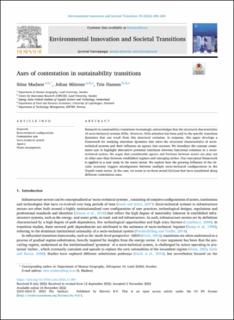| dc.contributor.author | Madsen, Stine Hach Juul | |
| dc.contributor.author | Miörner, Johan | |
| dc.contributor.author | Hansen, Teis | |
| dc.date.accessioned | 2023-08-31T16:23:17Z | |
| dc.date.available | 2023-08-31T16:23:17Z | |
| dc.date.created | 2022-11-16T15:13:29Z | |
| dc.date.issued | 2022 | |
| dc.identifier.citation | Environmental Innovation and Societal Transitions. 2022, 45, 246-269. | en_US |
| dc.identifier.issn | 2210-4224 | |
| dc.identifier.uri | https://hdl.handle.net/11250/3086712 | |
| dc.description.abstract | Research in sustainability transitions increasingly acknowledges that the structural characteristics of socio-technical systems differ. However, little attention has been paid to the specific transition dynamics that can result from this structural variation. In response, this paper develops a framework for studying transition dynamics that takes the structural characteristics of socio-technical systems and their influence on agency into account. We introduce the concept contestation axis to highlight alternative potential interfaces between functional solutions in a socio-technical system. We argue that considerable agency and frictions between actors can play out at other axes than between established regimes and emerging niches. Our conceptual framework is applied to a case study in the waste sector. We explore how the growing influence of the circular economy triggers misalignment between multiple socio-technical configurations in the Danish waste sector. In the case, we zoom in on three actual frictions that have manifested along different contestation axes. | en_US |
| dc.language.iso | eng | en_US |
| dc.publisher | Elsevier | en_US |
| dc.rights | Navngivelse 4.0 Internasjonal | * |
| dc.rights.uri | http://creativecommons.org/licenses/by/4.0/deed.no | * |
| dc.title | Axes of contestation in sustainability transitions | en_US |
| dc.title.alternative | Axes of contestation in sustainability transitions | en_US |
| dc.type | Peer reviewed | en_US |
| dc.type | Journal article | en_US |
| dc.description.version | publishedVersion | en_US |
| dc.rights.holder | © 2022 The Authors. Published by Elsevier B.V. | en_US |
| dc.source.pagenumber | 246-269 | en_US |
| dc.source.volume | 45 | en_US |
| dc.source.journal | Environmental Innovation and Societal Transitions | en_US |
| dc.identifier.doi | 10.1016/j.eist.2022.11.001 | |
| dc.identifier.cristin | 2075056 | |
| cristin.ispublished | true | |
| cristin.fulltext | original | |
| cristin.qualitycode | 2 | |

